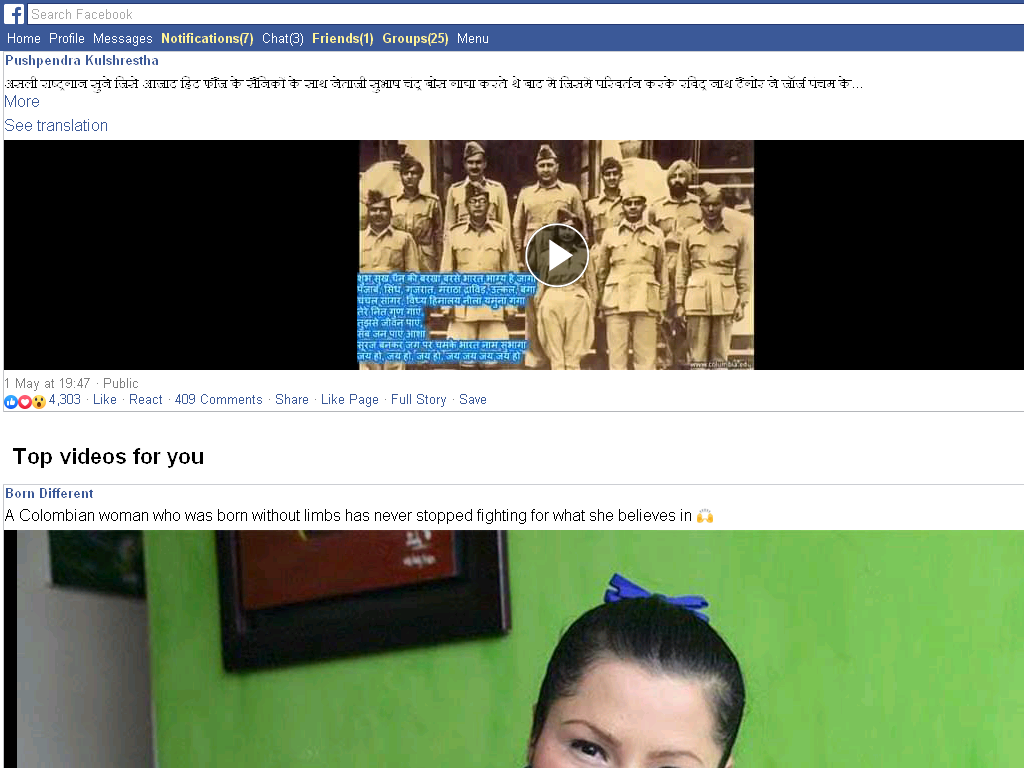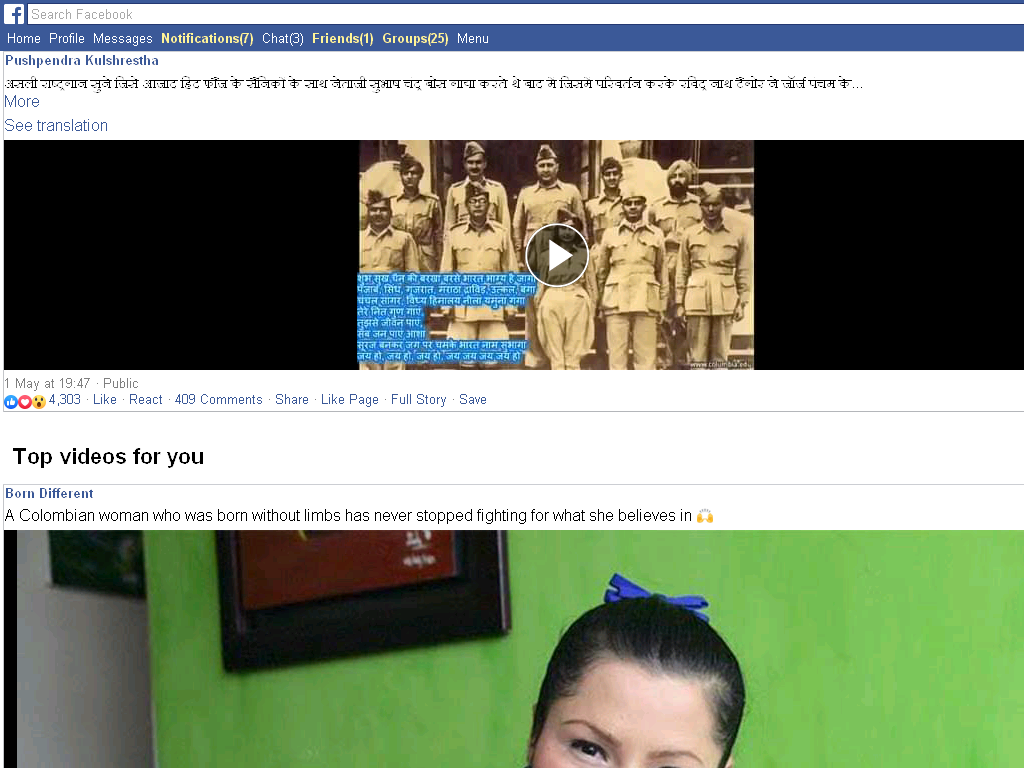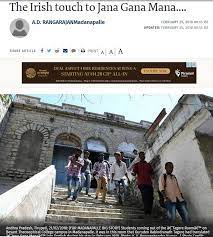A viral post claiming that the national anthem of the Provisional Government of Free India - 'Shubh Sukh Chain ki Barkha' - was tweaked and adapted by Rabindranath Tagore into the present day national anthem 'Jana Gana Mana', is false.
The caption accompanying the viral post reads, "Listen to the original national anthem that Subhash Chandra Bose used to sing along with the soldiers of Aazad Hind Fauj (Indian National Army) and later which was tweaked by Rabindranath Tagore to welcome George V, and which was later recognized as the national anthem by every government."
(Hindi: असली राष्ट्रगान सुने जिसे आजाद हिंद फौज के सैनिकों के साथ नेताजी सुभाष चंद्र बोस गाया करते थे बाद में जिसमें परिवर्तन करके रविंद्र नाथ टैगोर ने जॉर्ज पंचम के स्वागत में बनाया था और जिसे ही आज हर सरकार राष्ट्रगान की मान्यता देखकर गवा रही है |)
 Viral post
Viral post The post can be viewed here and its archived version can be accessed here.
Fact Check
BOOM found the claim to be factually inaccurate.
Jana Gana mana was first sung publicly on December 27, 1911 at the Calcutta session of the Indian National Congress.
The Indian National Army or the Aazad Hind Fauj was founded in 1942 by Rash Behari Bose and later revived by Subhash Chandra Bose in 1943.
The claim that the national anthem was first sung by Bose and the INA and was later adapted by Tagore does not hold water as Tagore's version existed even before the formation of the INA.
Shubh Sukh Chain Vs Jana Gana Mana
Shubh Sukh Chain was a Hindustani (Hindi and Urdu) adaptation of Brahmo hymn Bharoto Bhagyo Bidhaata written by Rabindra Nath Tagore in 1911. The song was translated by Bose himself, along with Captain Abid Ali (INA) and Mumtaz Hussain. The music for the song was composed by Captain Ram Singh (INA).
A rendition of Shubh Sukh Chain ki Barkha In an interview with Rediff, Captain Ram Singh had said "Netaji attached great significance to music as a source of inspiration for a force that was being prepared to fight till the finish. I distinctly remember that day in 1943, which Netaji came down to the then INA broadcasting station at the Cathay Building in Singapore and asked me to compose music for a song translated from Rabindra Nath Tagore's original Bengali score. He asked me to give the song a martial tune that would not put people to sleep but awaken those who were sleeping."
 Capt Ram Singh's interview
Capt Ram Singh's interviewThe song was adopted as the national anthem of the Provisional Government of Free India in 1943.
The Provisional Government of Free India or the Aazad Hind (Free India) was a India's provisional government established outside the country in 1943 to end British rule in India.
Controversy Over Music of Jana Gana Mana
Controversy has been raging for years as to who set the final tune for what is today recognised as the national anthem of India. BOOM went through several newspaper reports and archives and we found out is as interesting as the story of the Brahmo hymn becoming the national anthem of a country.
The Irish Connect
The hymn Bharoto Bhagyo Bidhata, written and set to music by Tagore in 1911, was sung publicly for the first time on December 27, 1911, day two of the Indian National Congress session, in Calcutta.
However, it was in the February of 1919 that a new tune was set to Tagore's composition by an Irish woman named Margaret Cousins. It was during his South India visit in the year 1919 that Tagore came to the Besant Theosophical college in Madanapalle, Andhra Pradesh.
Principal of the college - James Henry Cousins and his wife Margaret Cousins - had received the Bard of Bengal here. During a poetry reciting session at the college that Tagore sung the hymn in front of the students and the Cousins.
 The Hindu article
The Hindu articleWhat followed was history unfolding. After being explained about the poem, Margaret Cousins decided to compose a tune for it.
Read more about Jana Gana Mana and its Irish connect here and here.
BOOM also spoke to former director of Visva Bharati, Sabuj Koli Sen, who told us that the national anthem of India was indeed borrowed from the first stanza of Bharoto Bhagyo Bidhata written by Tagore in 1911. Visva Bharati, an academic institution, was founded by Tagore in 1921
The British Connect
However, the story of the national anthem takes a further twist from here. The tune set to Jana Gana Mana by Cousins was slow, somewhat similar to the way Tagore had sung it.
A pacier version of the anthem that we hear today was the handiwork of British musician and composer Herbert Murrill. Murrill is credited for the martial orchestral version of the national anthem.
Here is a report from the archives of The Hindu published on January 21, 1950, which talks about the approved version of Jana Gana Mana.
 The Hindu, 1950
The Hindu, 1950You can read more about Herbert Murrill's role in setting tune to Jana Gana Mana here and here.
What's The Confusion?
There has always been a confusion over the tunes of the national anthem and Subh Sukh Chain.
The marked similarity between the tunes of Subh Sukh Chain and Jana gana Mana is in their martial nature. While Subhash Chandra Bose wanted a marching song for the Indian National Army, the music of Subh Sukh Chain was set keeping that in mind.
Same was the case with Jana Gana Mana as Herbertt Murrill's orchestra chose to set a martial score for the national anthem of Independent India.
However, both of them have borrowed their original tune from Rabindra Nath Tagore's hymn Bharoto Bhagyo Bidhata, and thus the marked similarity.